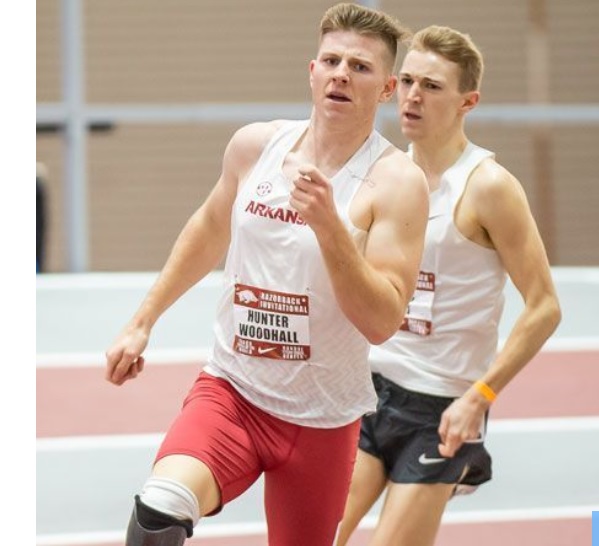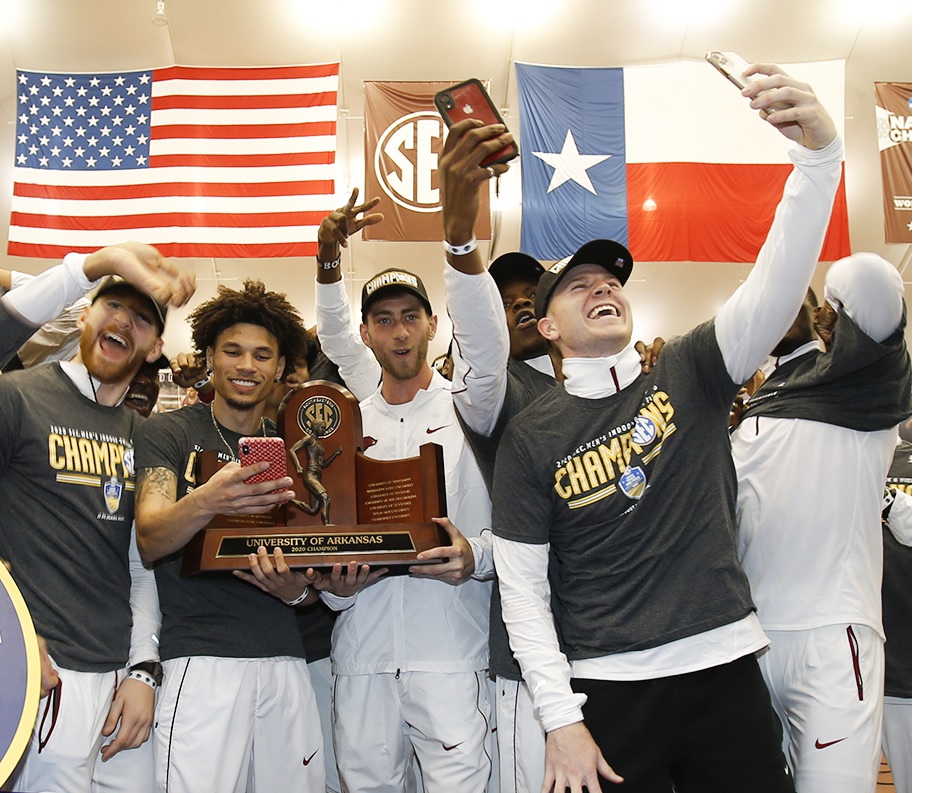Our latest conversation with Hunter Woodhall comes on the eve of the national championship meet for indoor track.
Hunter will be competing in one event at nationals, the 4×400 relay, running for a University of Arkansas track team that’s fresh off a dominating win in the SEC championships a couple of weekends ago. The Razorbacks enter this week’s meet ranked second in the nation in the 4×400, with the finals scheduled for Saturday, March 14, at 8:30 p.m. Eastern / 5:30 p.m. Pacific.
You can read last week’s conversation with Hunter here. The Tara and Hunter YouTube channel is on temporary hiatus, but there’s still a ton of great content available there and there’s no way you’ve watched all of it. Good time to catch up on what you’ve missed.

How is the indoor season going for you individually, and for Arkansas as a team?
Up until a couple of weekends ago [at the Tyson Invitational] I wasn’t very content with how I’ve been running. But I ran a good race and got back to where I wanted to be, and it put the pressure on for conference championships. As a team we’re doing really well. The atmosphere is the best I’ve seen since I got here. There’s a lot of positivity and a lot of support. We have a lot of guys who want to work really hard and win some stuff.
How do you like running the anchor leg on the 4×400 relay? That’s a change from last season.
Actually, last year in nationals I ran anchor. But this year our team is so good, and it’s a blessing to say but everyone is working really hard for their slot. Last year I ran second or third leg to get us positioned in the race so our anchor would have a shot, but this year our first three legs are so stout that by the time I get the baton, I’m probably going to be in the lead. So now it’s my job to back up all the hard work these guys have put in and try to finish. They’re a bunch of animals.
What kind of team does Arkansas have this year? Is it a young team, a veteran team?
We’re really, really young. Jalen [Brown] and I are both juniors, and the other two guys on the relay team are a sophomore and a freshman [the latter is Jamaican sensation Jeremy Farr]. So we’re really young. We have 6 of the top 11 guys in our conference for the 400, and we have 4 of the top 25 in the nation.
And my understanding is that the SEC dominates nationally in track the same way it does in football. Is that about right?
Yeah, year after year the SEC is the strongest conference as far as track and field. It’s always great competition, and that’s a reason people want to compete in the SEC. People are going to run fast, and hopefully that’s going to help you run fast as well. There are so many amazing athletes. It’ll humble you really quickly when you’re stepping out there with these guys.
Do the conference meets determine whether you go to NCAA nationals? What’s the connection between your performance in conference and qualifying for nationals?
For indoor track and field, it’s a little weird. The only way to get into nationals is to be a top time qualifier. So in individual events they’ll take the top 16 times—it doesn’t matter when they were run, doesn’t matter where they were run. The top 16 times in the nation make the nationals. For relays it’s the top 12.
For outdoor nationals, there will be conference and then you qualify for something called the regionals. And I believe it’s the top 24 from each side, East and West. If you make it to regionals, you have to run two rounds and try to advance. So you have to run fast on the day. They take the top 16 or whatever it is, and that’s who makes it to nationals.
Do you have a preference between running indoor versus outdoor?
Outdoor, any day of the week.
I figured that would be your answer. Why is running outdoor preferable? Is it just because you’re in a more natural environment?
Indoor is just really tough on my body. It’s a bunch of tight turns, which is really difficult. And then the banks as well. I don’t have any ankle or calf support or anything like that, so it just really tears my body up. The joints that are absorbing that blow on an angled surface, where you’re not running on even ground—there are so many systems that are accounting for all that energy, but for me it just goes straight up to my knees and my hips, because there’s nothing down lower to counter that. So it’s just a lot of pressure.

Southeastern Conference Indoor Track and Field Championships.
What does the rest of spring and summer look like for you? Do you have any time where you can get a break if you need some down time ? Or is it just all-out intense competition all the way to Tokyo?
When I get to the end of indoors, then I’ll be able to assess how my body feels. That’ll give me a really good road map for outdoor and how I’ll be feeling later in the year. It’s very much about the intentionality of what you’re doing. It’s about prevention rather than treatment. We want to prevent burnout from happening, and deal with it before it happens.
With my current workout cycle, there’s always a regression week within the cycle, where after three or four weeks of really intense training you take a week to back off and let your body recover. If my body specifically needs something more than that, it needs to be communicated between me, coaches, and training staff at the time it’s happening. Because if that’s something we wait on, it gets worse very quickly, and that makes it a lot harder to fix.
What is your training like during the season? What does a typical week look like?
It depends on where we are in the season, but we generally have about 10 sessions a week. As a rule of thumb, Monday is what we call our shakeout or recovery workout. We’re usually coming off a track meet the previous Friday and Saturday, so Monday is usually going to be something on the track—we’re running, but it’s focused on form and shaking off the dust from the meet. We’re usually lifting on Monday as well. Tuesday is gonna be a more technical day. We’ll do a lot of speed drills, sprinting, and a lot of details related to form that are really meant to work your nervous system. They’re not very high volume days, they’re more focused on all the little t’s and i’s.
Wednesday is our really hard workout day most of the time. That’s going to be something that’s absolutely horrible. It’s going to be high volume, high intensity, and then right after that we’ll go to the weight room again. Thursday is very similar to Tuesday. If we don’t have a meet that weekend, it’s going to be very nervous-system oriented—lots of speed, very fast stuff. If we have a meet Friday-Saturday, then Thursday is just a shakeout. We’ll just shake the dust off, do a pre-meet lift.
Then obviously, Friday-Saturday we’re at our events if there’s a meet. If we don’t have a meet, then usually Friday is kind of a low-key day, and Saturday is a high-intensity workout with a weight session after. And then Sunday is usually a recovery day, whether or not we have a meet. We’re usually asked to come in, do a recovery lift, do some yoga, and there’s also usually a pool workout in the morning.
Do you get any break between the end of indoor season and the start of outdoor?
It’s difficult because the goal is obviously to peak when you get to the end of indoor. You want to be able to run as fast as possible at that time. And then there’s kind of a rush to re-cycle and kind of re-set the body back to square one, so you can work toward peaking again for outdoor nationals. There’s no way to hold your peak performance from the middle of March [when indoor season ends] all the way to June [when outdoor season ends]. It’s just not gonna happen.
Earlier you were telling me how important it is that you and [prosthetist] Francois [Van Der Watt] really see eye to eye when it comes to your legs. Do you have any similarly close partnerships at Arkansas with coaches, trainers, nutritionists or whoever?
Any time you pick a college program, you’re going to choose one you feel like you can trust. Especially your coaches and training staff. I definitely feel like we have a very strong relationship. For me, one of the biggest things is just communicating. I feel like I can do that in a safe environment.
Furthermore, the guys on my team, I love them like brothers. We take care of each other and look out for each other. A lot of times, they’re the best coaches. They’re the ones who are running with you right there, they’re the ones who are going to be real honest with you and want to see you get better. It’s kind of just a whole team of support. We bounce ideas off each other, and everyone’s kind of on the same page.
Can you think of any cases at Arkansas where you’ve gotten coaching from a teammate that had a sustained influence on you? Something you integrated into your running on a permanent basis?
There’s literally so many things. It’s an everyday occurrence. One of the things that comes to mind right away is that when I first got to school, I wasn’t doing a lot of weight training. So just being in the weight room was really new for me. We have one weightlifting coach for 40 guys—there’s two or three assistant coaches, too, but not enough to go around and coach everybody individually. So you’re at a rack with one or two teammates, and those are the guys who are really watching your form, checking what you’re doing, and helping you make corrections.
On the running side of things, a lot of the tips in that are from upperclassmen teaching you about anything from running rounds to competing at that level. It’s very different.
I think most people—I know I’m guilty of this—we think of track and field disciplines as being individual sports. You’re conveying that there’s really a lot of teamwork that goes into achieving good results.
100 percent. If we look at the Olympics or the Paralympics as the pinnacle of track and field, someone like Usain Bolt runs a nine-second race. He’s training four years to run nine seconds. There’s a lot of time behind the scenes going into those nine seconds. There are a whole lot of other people getting you to that point.
A race for me is less than a minute. It’s such a small amount of time where I’m by myself, on my own, racing. The rest of it is support and coaching and all these people behind me. Only about 40 seconds of it is completely my own effort.



